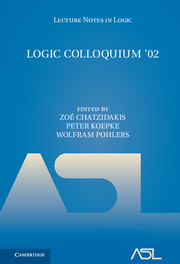Book contents
- Frontmatter
- Contents
- Preface
- Participants Photograph
- Generic absoluteness for Σ1 formulas and the continuum problem
- Axioms of generic absoluteness
- Generalised dynamic ordinals — universal measures for implicit computational complexity
- The Worm principle
- “One is a lonely number”: logic and communication
- Computable versions of the uniform boundedness theorem
- Symmetry of the universal computable function: A study of its automorphisms, homomorphisms and isomorphic embeddings
- PCF theory and Woodin cardinals
- Embedding finite lattices into the computably enumerable degrees — a status survey
- Dimension theory inside a homogeneous model
- Reals which compute little
- Bisimulation invariance and finite models
- Choice principles in constructive and classical set theories
- Ash's theorem for abstract structures
- Martin-Löf random and PA-complete sets
- Learning and computing in the limit
- References
Symmetry of the universal computable function: A study of its automorphisms, homomorphisms and isomorphic embeddings
Published online by Cambridge University Press: 31 March 2017
- Frontmatter
- Contents
- Preface
- Participants Photograph
- Generic absoluteness for Σ1 formulas and the continuum problem
- Axioms of generic absoluteness
- Generalised dynamic ordinals — universal measures for implicit computational complexity
- The Worm principle
- “One is a lonely number”: logic and communication
- Computable versions of the uniform boundedness theorem
- Symmetry of the universal computable function: A study of its automorphisms, homomorphisms and isomorphic embeddings
- PCF theory and Woodin cardinals
- Embedding finite lattices into the computably enumerable degrees — a status survey
- Dimension theory inside a homogeneous model
- Reals which compute little
- Bisimulation invariance and finite models
- Choice principles in constructive and classical set theories
- Ash's theorem for abstract structures
- Martin-Löf random and PA-complete sets
- Learning and computing in the limit
- References
Summary
Abstract. In this paper we study the symmetry of the universal computable function by means of its automorphisms, homomorphisms and isomorphic embeddings. We show that all these functions are computable and also study other related functions with similar properties.
We also reproduce this study for the predicate expressing membership of an element to a recursively enumerable set. The results found for this predicate are quite different from those found for the universal computable function, especially when concerning homomorphisms. This shows that there exists a deep difference between these two, for all the other, closely related objects.
Introduction. One of the most important objects in the study of the recursive functions is the universal computable function, which makes it possible to compute the values of those functions in a uniform and algorithmic way. That is, if is an acceptable system of indices (see [3]) for the unary partial computable functions, then the function
is also computable.
Hence, it is interesting to study its properties, including its symmetry. The usual way to accomplish this is to study the automorphisms, isomorphic embeddings and homomorphisms of the object (see [1] for the definitions). In this case we will study the corresponding functions for the graph of ϕ. We will denote this predicate by P, so
for all natural numbers e, x and y.
A permutation f of the natural numbers will be an automorphism [1] of this predicate if
for all natural numbers e, x and y; that is, if
for all natural numbers e, x and y.
Thus, these automorphisms are changes of coordinates with respect to which the computations of the recursive functions are performed in exactly the same way as in the original model. In other words, these are the symmetric transformations which take into account the way the computable functions are actually computed.
Another interesting predicate closely related to P is the one that expresses membership of an element to an r.e. set. Since r.e. sets are exactly the domains of the unary partial computable functions (see, for instance, [4]), if we define (as usual)
the new predicate, which we will denote by W, will have the form
for x, y natural numbers.
Information
- Type
- Chapter
- Information
- Logic Colloquium '02 , pp. 152 - 171Publisher: Cambridge University PressPrint publication year: 2006
